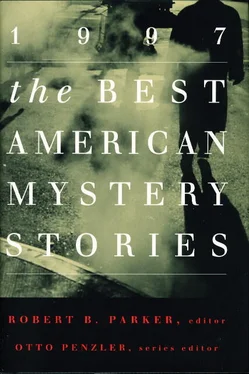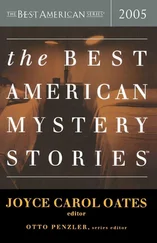“Shmulik,” she gargled. “Shmulik—” and she clawed at the wood door, trying to push it open in the suffocating blackness.
Terry held her down, wrestling his body atop hers, his eyes wide in the stifling, airless hidey-hole.
“No-no-no-no,” he wheezed, his hands tightening on the child’s mouth and nose. Hurting her, he knew, but he had to, to protect her. “Shmulik’s okay, Liz. He’s okay right where he is. He’s a big bear. He can take care of himself.”
The outside door splintered. Terry could hear the wood give way and he cringed as automatic weapons raked the place. Loud voices. Arabic. Screams. Liz echoed them, or tried to — Terry held her down as she struggled. More shots. More screams. From... somewhere, a drum beat loudly, incessantly, against his ear. He realized it was the pulse in his wrist. He tried to still it. Took the knuckle of his index finger and put it in his mouth. Bit down hard. The pain would kill the noise. Under him, Liz calmed down, her sobbing stopped. Now the loudest noise in the black was his own heartbeat.
Other voices. Gunshots. Distant voices. How long had they lain there? Minutes? Hours? His eyes closed in the darkness. Terry waited, waited, waited.
Other voices closer now. Hebrew or Arabic? He bit on his finger until tears came to his eyes. Quiet, Lizzie, or they’ll hear us. The monsterim. Big teeth. Sharp knives.
Lights outside their hiding place. Oh, God, we’re found out... be killed. Voices. Shots. Hebrew. English. English English English: “Mr. Robinson — Mr. Robinson, this is the Army.”
Pounding. Sudden brilliant light. His eyes couldn’t take it. Wincing, he saw a lethal silhouette, a helmeted face, a hand holding an Uzi submachine gun.
Arms dragged him and Liz into the room.
Hands lifted him. Quick frisk then onto the bed. God it was cold. A body was sprawled on the floor, red-and-white keffiyeh splotched with blood covering the head. Nearby, two grenades and an AK-47 rifle with long, curved ammo clips taped back to back. The corpse was reaching for the weapons with a stone-dead hand.
He tried to find his daughter. “Liz? Liz? You okay, kiddo? We made it, Lizzie. The Army’s here. The bad men are all gone (They are gone, aren’t they? You killed the sons of bitches, didn’t you?) Don’t worry, Liz, the bad men all gone.”
Where the hell’s the bear? Where’s Shmulik? Lizzie wants Shmulik. She’d cried for Shmulik. Where’s the goddamn bear?
“Sit up Mr. Robinson,” said a voice. “Please sit up.”
He obeyed, his eyes still unaccustomed to the brightness of the room. “Liz — where’s Liz?”
The commando had her. The hooded commando in black SWAT clothing, dripping state-of-the-art ordnance, looking like a character out of a Ninja fantasy, had Liz in his arms and he was KISSING HER? KISSING HER ON THE LIPS? Terry launched himself across the room but strong arms held him back.
The commando’s eyes raised toward Terry but his mouth never left Liz’s lips. He lowered the child onto the floor, pushing on her chest, muttering a cadence in Hebrew, “Echad, shtyim, shilosh, arba, shesh...” then blowing in her mouth.
The commando’s eyes locked with his own. Dead gray eyes. Terry would recall much, much later. Dead gray eyes peering through holes in the black balaclava hood.
There was a lot of muted conversation carried on in Hebrew as he sat on the edge of the bed, the hands of soldiers, strong young men in khaki and black who blocked his view, resting on his shoulders while his own hands supported his head. He didn’t understand a word of it. But something was terribly wrong.
Finally, a captain knelt by his side. Terry stared at the man uncomprehending, noting — absurdly, he thought for an instant — the crow’s-feet around the officer’s eyes and the deep scar along the man’s neck and wondering where he’d gotten them. The Israeli put his arm around Terry’s shoulder and squeezed.
“She is gone, Mr. Robinson. I’m sorry.”
Sorry? Gone? Who’s gone? Gone where? Gone how?
Then, he saw. Then he realized what he’d done.
The commando was laying Liz on a stretcher, oxygen mask obscuring most of her small face, still pushing down on her chest and counting the goddamn Hebrew syllables, “Echad, shtyim, shilosh, arba,” and Liz, Liz, Liz’s eyes were closed and — “Ooh, God — NOOOO!”
He screamed and lurched toward the stretcher where they were tying down the corpse of his daughter his love his child oh, God, no. “Please — God, take me now. Take me, take me, take me. Not her. Not Liz. Oh, please. God — Maggie — God, my baby, my baby. Dear God, no!”
Things went black and white. The soldiers held him down, he fighting against them, nauseated by the sweaty jumble of arms and bodies smelling of fear and death. From somewhere a hand with a syringe appeared and it went into his upper arm right through the shirt and then the room started to spin crazily, bright lights blinking neon like Piccadilly in the rain and he felt himself disappearing into a crystal vortex and the last words he heard himself scream were, “Don’t you idiots understand? Take her teddy, take her teddy — there are monsterim.”
Monica Wood
Unlawful Contact
from Mãnoa
The last time I saw my brother I came home burdened with pretty things, ornamental nothings I’d come upon while browsing through the string of perfumed boutiques in town. Except for the earrings my brother bought for me on a whim, they were my purchases: hair clasps, silk flowers, wind chimes, marbles. I had no use for them and no one I cared to give them to, but that day in my brother’s presence their luster seemed necessary. While my brother and I watched, salesgirls wrapped the trinkets in rustly, translucent, pastel-colored tissue, then dropped them into shiny bags of the same colors. The earrings I wore home.
I can imagine how we must have looked that day, my brother lumbering behind me, his two years of prison a dull mask over his face. He’d cut his hair and buttoned his shirt to the top, as if to camouflage the length of days that trailed him; but they followed him anyway, as visible as tin cans tied to the backs of his shoes.
Our meeting was a secret, though we met in a public place — the park square downtown, in the heart of the waterfront shopping district. He waited under the red sprawl of a sugar maple, head down, hands thrust deep in his pockets. I could have ducked behind a building and gone home with a free mind, with nothing further to hide from my husband and daughter, but I stood in the open until he saw me.
We greeted each other like strangers, or worse than strangers: we did not hug or shake hands; we simply faced each other and said hello. We settled ourselves on a bench like people waiting for a bus, looking straight into the emptiness before us. We said a few things, about our mother’s health, and our sister’s upcoming wedding (to which my brother would not be invited), and the weather, and how hard it was to find work after prison.
“Do they know you’re here?” he asked.
He was still a young man but looked so shockingly old.
“Meg?” he said.
“No.” I was staring at the flower beds that ringed the park, the frilly summer flowers gone now, replaced by stiffer blooms in muted colors.
He pulled a pack of cigarettes out of his shirt pocket. I watched him light one and inhale. He shrugged, an apology. “You pick up some bad habits.”
I nodded. The smell of cigarettes was a comfort because it was unfamiliar — he could have been anybody.
“It’s not going to cost you, is it?” he said. “Coming out here, I mean.”
I didn’t answer until he’d smoked the cigarette down. He made a long sucking sound and then stamped the cigarette out with the sole of his shoe. He was thinly dressed for the weather but didn’t appear to be cold.
Читать дальше












